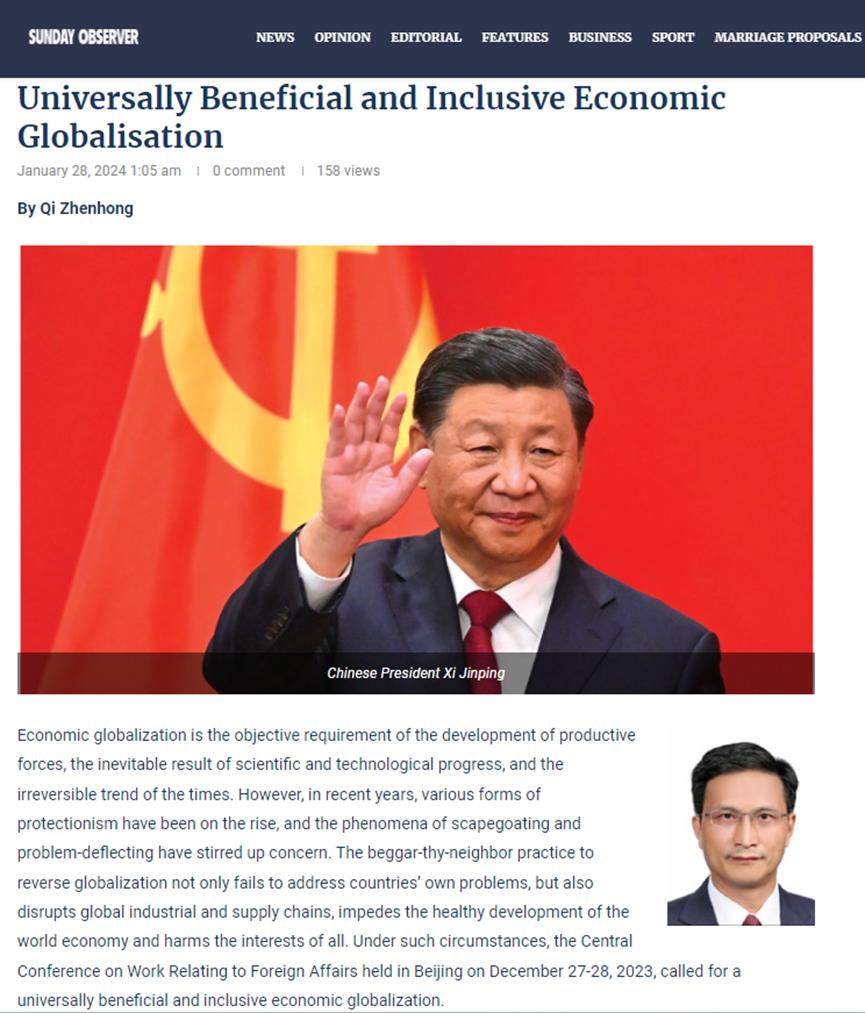To disseminate the principles of The Central Conference on Work Relating to Foreign Affairs and outline China’s foreign policies, H.E. Chinese Ambassador Qi Zhenhong published the second in a series of signed articles titled “Universally Beneficial and Inclusive Economic Globalisation”, in the English-language mainstream media Sunday Observer on 28 January 2024.
Full text is as follows:

Economic globalisation is the objective requirement of the development of productive forces, the inevitable result of scientific and technological progress, and the irreversible trend of the times. However, in recent years, various forms of protectionism have been on the rise, and the phenomena of scapegoating and problem-deflecting have stirred up concern. The beggar-thy-neighbor practice to reverse globalisation not only fails to address countries’ own problems, but also disrupts global industrial and supply chains, impedes the healthy development of the world economy and harms the interests of all. Under such circumstances, the Central Conference on Work Relating to Foreign Affairs held in Beijing on December 27-28, 2023, called for a universally beneficial and inclusive economic globalisation.
A universally beneficial economic globalisation is one that meets the common needs of all countries, especially the developing countries, and properly addresses the development imbalances between and within countries resulting from the global allocation of resources. The goal is to ensure adequate and balanced development, and form a globalisation that fosters accelerated growth of all countries in the world, especially the developing countries. We must work together to make the pie of economic globalisation bigger and share it equitably, so that different countries, classes and groups of people can enjoy the fruits of economic and social progress, and achieve mutual benefits and common prosperity. This is the vision of Chinese President Xi Jinping and the Communist Party of China (CPC).
While pursuing benefits for all, China also believes that a sound economic globalisation should be inclusive. Like a Chinese saying goes, plants with strong roots grow well, and efforts on the right path ensure success. The inclusive economic globalisation also follows such a principle, which means supporting all countries to find development paths that suit their own national conditions, while working together to create common development for all mankind.
To this end, we must oppose all forms of unilateralism and protectionism, and resist discriminatory and exclusive standards and rules. Meanwhile, it is necessary to maintain the stability and smoothness of global industrial and supply chains, promote mutual understanding, mutual accommodation and accommodation of each other’s interests and concerns, resolve structural problems that hinder the healthy development of the world economy, and maintain the vitality and momentum of global economic growth.
The universally beneficial and inclusive economic globalisation is the clarion call of our time. The world today is facing multiple challenges, such as extreme polarization between the rich and the poor, price volatility in the global food and energy markets, and uneven distribution of resources. Some have chosen to retreat to the path of anti-globalisation, resorting to protectionism and unilateralism, and building “small yards, high walls”. Such acts reveal the mentality of sitting-idle and seizing the maximal profits with no regard to others’ benefits. As an old Chinese saying goes, it is harder to break a bundle of arrows than a single arrow. Each country would not stay unaffected in front of the challenges to global economy and it is imperative to rise to those difficulties together.
The universally beneficial and inclusive economic globalisation promises win-win cooperation. Such a kind of economic globalisation is not merely an economic term, but is endowed with tangible benefits. In 2013, Chinese President Xi Jinping proposed the Belt and Road Initiative (BRI), which, after a decade of development, has effectively promoted greater economic integration and development, as well as the sharing of development dividend.
The practices under the BRI make up a perfect miniature of the universally beneficial and inclusive economic globalisation. The reality is the best evidence. Over the past 10 years, the BRI has lifted nearly 40 million people out of poverty, paving a path of opportunity and prosperity for local people.
It is true that economic globalisation is facing challenges in today’s world. Nevertheless, would you not walk any more just for fear of the possibility of falling down? The same applies to the economic globalisation momentum. It is unwise to retreat from the track of economic globalisation due to temporary headwind against us. And the universally beneficial and inclusive economic globalisation is exactly a Chinese solution amid the setbacks of economic globalisation, which draws the blueprint for the common prosperity in the future.
China and Sri Lanka are important practitioners of world multi-polarity and economic globalisation, and China-Sri Lanka cooperation has become a model for South-South cooperation. As a significant partner country of the BRI, Sri Lanka has witnessed the thriving of a series of infrastructure projects supported by Chinese enterprises, which contributed to the development of Sri Lanka’s economy and improvement of local people’s livelihood. In addition, China and Sri Lanka have also actively engaged in agricultural cooperation by establishing agricultural cooperation parks and promoting exchanges on agricultural science and technology, helped to ease the food shortage of Sri Lanka. All of those vividly reflect the original purpose of economic globalisation, which is to benefit the whole world.
China is ready to work with Sri Lanka and other countries in the world, to hold high the great banner of a community of shared future for mankind, advance world multi-polarity and economic globalisation, and create more benefits to the people of all countries.
The writer is the Ambassador of the People’s Republic of China in Sri Lanka. This is the second in a series of articles penned by the Ambassador on China-Sri Lanka ties and regional and global affairs.